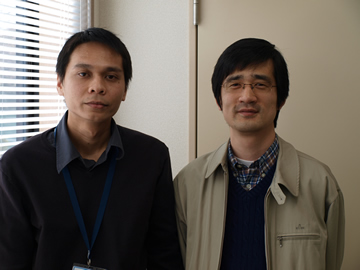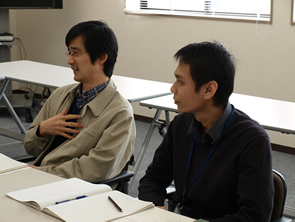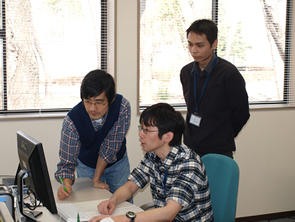Interview with STAR program participants
Mr. Jayranon Plaidoung, GISTDA/ Thailand
Mr. Hyun-kyu Shin, KARI/ Korea
March 12, 2010
STAR program office in JAXA Sagamihara Campus

Mr. JayranonMr. Shin
The APRSAF Secretariat visited the STAR program office on the JAXA Sagamihara Campus on 12 March 2010, and conducted an interview with STAR program participants, Mr. Jayranon from GISTDA, and Mr. Shin from KARI.
Mr. Jayranon has a background in Tele-communication engineering. He works at GISTDA as a satellite control engineer on the THEOS project. He commanded and monitored satellite at the time of THEOS operation.
(THEOS: the first Thai earth observation satellite. It was successfully launched on Oct 1, 2008)
Mr. Shin is in charge of developing flight software for Korean satellites. He studied software engineering, and in particular engineering using formal methods for verifying software in a mathematical way. He has a great interest in development processes, and in considering ways to develop software, as well as managing projects, and what ought to be done during a project.
Please explain your role in the STAR program.

Mr. Shin:
We are now in the very early stage of satellite development. Hence, all participants are involved in all activities in the program. We are discussing every aspect of satellite development and the program itself. Everybody has their own areas of interest. As for me, as I am a flight software engineer, I’m mainly involved in software. In developing flight software for the Micro-STAR, I have been preparing several things, including programming language, the development environment, and developing methodologies. I want to apply new technology, new ways and different approaches to our projects. So, I suggested applying Real-Time Java to flight software and want to adopt Agile methodology to our development process. Therefore, at the WebEx meeting, I introduced TDD (Test Driven Development) with a simple example - one of the best practices of XP (eXtreme Programming).
Mr. Jayranon:
The STAR program is conducted on a voluntary base. Tasks are assigned to STAR program participants reflecting program activities and also the participants’ backgrounds and interests. I have a background in satellite operation, so I am interested in taking charge of ground station design at the concept design phase.
How do you plan to use this experience when you are back in your country?
Mr. Shin:
My appointment was originally for 6 months. So I may return to Korea next month. After I return to Korea, I want to apply what I have learned during this program to our activities. In Korea, there are many space programs and activities, so these experiences will be valuable. I hope this STAR program will be very helpful, not only to our team and KARI, but also to all other Asian organisations.
Mr. Jayranon:
I can learn much about the technology and gain much knowledge in Japan. After I return to Thailand, because the space development budget is not a small one, it’s necessary to know what Thailand’s requirements, or those of other users, are. We can then apply technologies which are suitable for these requirements. I need to study them first.
Capacity building is very important in the Asia-Pacific region. What do you think about programs like STAR?

Mr. Shin:
I think this program is very useful for developing individual and organisational capacity. It is a very practical. We can also learn how to cooperate with other countries.
Mr. Jayranon:
In my case, I am a satellite control engineer, so at space the development level, I am a user. Sometimes I'd like to know how I can design and how I can test satellites to enhance their uses. I think this program can help provide the answers.. In Japan, I learned about satellite design and test procedures. This was most interesting.
What do you think about the difficulty of the STAR program?
Mr. Tsuji (JAXA):
All participants who leave it should comment on improving the program. I am very interested in your opinions.
Mr. Jayranon:
I understand much about what is happening. For example, currently, we are waiting for mission review meeting of Micro-STAR satellite. This may be a challenge for the next stage. If we cannot make decisions about missions, we cannot proceed to analyze the next step in any detail. However, this is not a major problem. Analyses can proceed through making assumptions and doing case studies.
Mr. Tsuji:
We also have difficulties including budget constraints, and are struggling to coordinate various departments. However, as far as manpower is concerned, I think this will be in good shape in the near future. Next month we will have two more participants from VAST/STI, Vietnam. Another person will come from LAPAN, Indonesia.
This interview was conducted in an informal atmosphere. Whilst they are dealing with a challenging project, they also appear to enjoy life in Japan: Mr. Shin has come to like the Japanese pop group, Kiroro, and Mr. Jayranon enjoys taking photographs and has travelled to several places, including Kyoto and Hakone.
Their appointments are -
Mr. Jayranon: June 2009 - May 2010
Mr. Shin: October 2009 - October 2010 (extended)